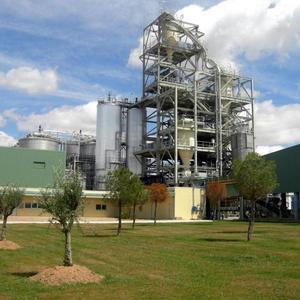Abengoa inaugurates W2B demonstration plant

Abengoa
June 27, 2013
BY Abengoa
Abengoa has inaugurated its demonstration plant that uses Waste-to-Biofuels (W2B) technology. The plant has a capacity to treat 25,000 tons of municipal solid waste (MSW) from which it will obtain up to 1.5 million liters of bioethanol for use as fuel.
The demonstration plant located in Babilafuente (Salamanca, Spain) uses W2B technology developed by Abengoa to produce second-generation biofuels from MSW using a fermentation and enzymatic hydrolysis treatment. During the transformation process, the organic matter is treated in various ways to produce organic fiber that is rich in cellulose and hemicellulose, which is subsequently converted into bioethanol.
The production of bioethanol from municipal solid waste is a major technological breakthrough in the waste management model, since it increases the recovery rate, minimizes the carbon footprint and generates major benefits for society. It is a renewable and clean source of energy that helps to cut our dependency on fossil fuels while reducing greenhouse gas emissions per kilometer travelled by 70 percent. Furthermore, it maximizes the recovery of the organic fraction of the MSW and prevents more than 80 percent of the waste ending up in landfill.
Advertisement
W2B technology also generates green jobs, encouraging regional and national economic growth while contributing to the country’s balance of payments, preventing imports.
During the opening, Manuel Sánchez Ortega, CEO of Abengoa said, “This plant once again highlights Abengoa’s commitment to technological research and innovation, which has enabled it to maintain a competitive advantage in its sectors, leading projects with huge technological potential and programs that involve world-leading research centers and strategic partners”.
Advertisement
The bioethanol produced at the W2B plant has multiple uses such as an additive for gasoline, increasing its octane rating; as fuel for cars; for use in the chemicals and pharmaceutical industry (in solvents or cosmetics, for example), and even as an intermediate product in producing jet fuel.
With this new plant, Abengoa is reasserting its commitment to the environment and sustainable development, especially in the biofuels sector, consolidating its leadership position and its innovation this field.
Related Stories
The U.S. EPA on May 14 delivered two RFS rulemakings to the White House OMB, beginning the interagency review process. One rule focuses on RFS RVOs and the other focuses on a partial waiver of the 2024 cellulosic RVO.
The U.S. EPA on May 15 released data showing nearly 1.79 billion RINs were generated under the RFS in April, down from 2.09 million generated during the same month of last year. Total RIN generation for the first four months of 2025 was 7.12 billion.
Calumet Inc. on May 9 announced sustainable aviation fuel (SAF) capacity at its Montana Renewables biorefinery is expected to reach 120 MMgy to 150 MMgy sooner than previously reported for a fraction of the originally expected cost.
Tidewater Renewables on May 8 announced that its 3,000-barrel-per-day renewable diesel plant in Prince George, British Columbia, operated at 75% capacity during the first quarter, up from 71% during the same period of last year.
Aemetis Inc. released Q1 results on May 8, reporting increased biogas production, progress with efficiency improvements at the Keyes ethanol plant, and resumed biodiesel deliveries. Financing activities are also underway for a proposed SAF project.
Upcoming Events










